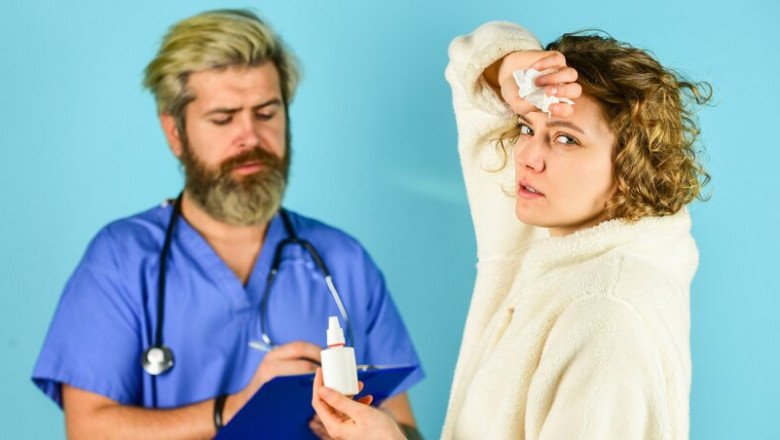
views
There are different types of Fever Medicine that you can buy for your child. Some of these medicines include acetaminophen and ibuprofen. If you decide to buy these for your child, ensure you know exactly what you are buying and how to take them. It would help if you also learned how to monitor your child's symptoms to help prevent further complications.
Common causes of fevers
Fever is an increase in body temperature that can signal an underlying health issue. Viral, bacterial, or inflammatory infections usually cause it. However, fevers can also be caused by medications.
In some cases, fevers can indicate a severe medical condition, such as an infection of the central nervous system. If your child is experiencing symptoms of a central nervous system disease, such as convulsions, a headache, or confusion, they should seek immediate medical attention.
Children should also be kept from school and other activities that may aggravate the fever. Antipyretics can quickly bring the fever down. They should also avoid drinking large amounts of sweetened drinks.
Acetaminophen and ibuprofen
Acetaminophen and ibuprofen are two popular fever medicines. They both reduce fevers and ease the pain. However, they do so in very different ways. For example, acetaminophen only reduces pain, whereas ibuprofen decreases swelling and inflammation.
Both medications block the prostaglandin hormone, which causes inflammation and promotes pain. The hormones are made by a chemical called the COX enzyme. As a result, acetaminophen and ibuprofen can reduce pain, but each works on a different organ.
Some studies show that ibuprofen can cause liver damage. It is also a risk factor for cardiovascular side effects. So, taking ibuprofen with caution is essential if you have any of these conditions.
Aspirin
In addition to its well-known uses as an anti-inflammatory, aspirin is also a safe, effective medicine for fever. However, like any medication, aspirin can cause side effects and has the potential to interact with other drugs. So, if you have a question about how it works or if it is safe for you to use, you should talk with your doctor.
Aspirin is a member of a group of drugs called nonsteroidal anti-inflammatory drugs (NSAIDs). Its active ingredient is a salicylate. Other medications in this group include ibuprofen and Motrin IB. These medicines reduce inflammation and pain and treat headaches, cold sores, and other minor aches and pains.
Qurs Bukhar Ajmali
Qurs Bukhar Ajmali is an herbal Fever Medicine by Dawakhan Hakeem Ajmal Khan for malarial fever. It is a type of fever that is caused by parasites, and this disease parasite is transmitted to the human body through the bite of an infected mosquito. A person infected with malaria often becomes sick with a high fever and experiences shaking chills.
Qurs Bukhar Ajmali is the best herbal medication from Dawakhana Hakeem Ajmal Khan for treating malaria and seasonal fever properly. From time to time, it recovers you from all the symptoms of malaria and makes you feel active. Malaria can be a severe threat to the human body if left untreated, so if you experience any similar symptoms, you are requested to book an appointment with our expert herbal physicians at Dawakhans Hakim Ajmal Khan to cure your Malaria fever as fast as possible.
Sponge
Fever is something that is not uncommon in children. Although it is a medical condition that can last a few days, it is still manageable. The best advice is to keep your kids as cool and calm as possible. Wear light clothing to allow heat exchange, and remember to offer them plenty of liquids. A cool compress to the groin and nape of the neck is also in order.
Sponge baths are not for everyone, but they can be an excellent way to soothe a feverish child. One study found that tepid sponge baths can reduce a youngster's temperature by a couple of degrees.
Monitor your child's appearance and symptoms of a fever
Fever is one of the most common symptoms of illness in children. It's a good sign that the body is working to fight infection. However, fevers can be scary for parents. Here are some of the most important things to monitor if your child has a fever.
Medications may help lower a fever. These include acetaminophen and ibuprofen. You should contact a physician if a fever isn't responding to these medications. Alternatively, give a warm sponge bath, which should lower a child's temperature.
In addition, your child should drink plenty of water. It would be best if you also watched for other signs of discomfort. Some children with fever may start shivering. A shivering child may raise their temperature, so be sure to check for shivering in your child.
Seizures are harmless
If your child experiences a seizure, it is essential to call 911. The doctor can diagnose the cause of the attack and get the child the help he needs.
You should not give your child fever medicine during a seizure. It is because the medication could cause severe side effects. Antihistamines should also be avoided during an episode.
A seizure does not cause permanent damage to the brain. However, if your child is experiencing a prolonged attack, you should take them to the hospital.
When your child is having a seizure, you should stay calm. Avoid shaking your child or trying to open his mouth.












Comments
0 comment